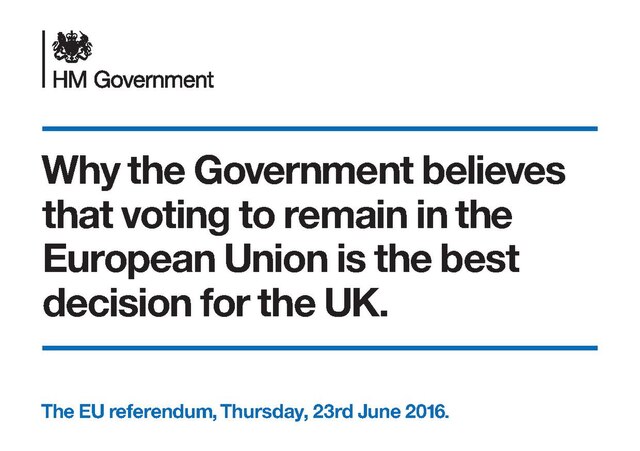Editing Pro-EU leaflet - Wikipedia
 Article Images
Article Images
You are about to undo an edit. Please check the comparison below to verify that this is what you want to do, then publish the changes below to finish undoing the edit.
If you are undoing an edit that is not vandalism, explain the reason in the edit summary. Do not use the default message only.
| Latest revision | Your text | ||
| Line 7: | Line 7: | ||
The 16-page leaflet warns the British public that Brexit would increase the [[cost of living]] in the UK,<ref name=Mayes/> damage living standards,<ref name=Glenday/> and lead to "a decade or more of uncertainty".<ref name="Stewart, Heather"/><ref name=Mason/> The pamphlet provoked immediate outrage from individuals and organisations that were campaigning to leave. [[Boris Johnson]], [[Mayor of London]], criticised the government for spending taxpayers' money on the leaflet, calling it "crazy" and "a complete waste of money",<ref name=Steerpike/> while [[Vote Leave]], the referendum's official campaign in favour of leaving the EU, accused Cameron of creating the pamphlet to distract media headlines away from his involvement in the [[Panama Papers]] scandal.<ref name=Grierson/> |
The 16-page leaflet warns the British public that Brexit would increase the [[cost of living]] in the UK,<ref name=Mayes/> damage living standards,<ref name=Glenday/> and lead to "a decade or more of uncertainty".<ref name="Stewart, Heather"/><ref name=Mason/> The pamphlet provoked immediate outrage from individuals and organisations that were campaigning to leave. [[Boris Johnson]], [[Mayor of London]], criticised the government for spending taxpayers' money on the leaflet, calling it "crazy" and "a complete waste of money",<ref name=Steerpike/> while [[Vote Leave]], the referendum's official campaign in favour of leaving the EU, accused Cameron of creating the pamphlet to distract media headlines away from his involvement in the [[Panama Papers]] scandal.<ref name=Grierson/> |
||
The Brexit referendum was held on 23 June, with 51.89 per cent of the votes cast being in favour of leaving the EU. After almost four years of negotiations on the terms of departure and on future relations, the UK formally left the EU on 31 January 2020. |
The Brexit referendum was held on 23 June, with 51.89 per cent of the votes cast being in favour of leaving the EU. After almost four years of negotiations on the terms of departure and on future relations, the UK formally left the EU on 31 January 2020. |
||
In February 2019, an analysis of the impact on the British public of exposure to the leaflet concluded that it had led to a decrease of three percentage points in the probability of an individual voting to leave in the referendum. |
|||
==Background== |
==Background== |
||